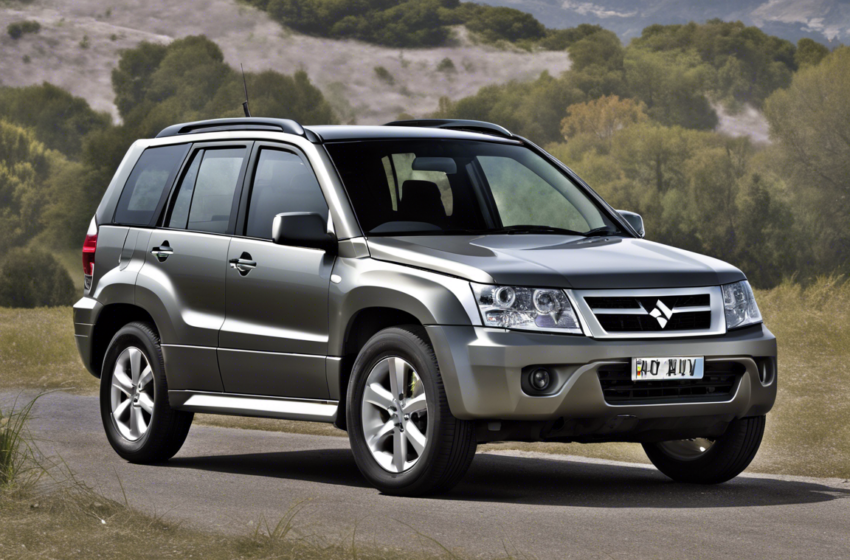Exploring the Grand Vitara Safety Rating: What You Need to Know

In the world of compact SUVs, the Suzuki Grand Vitara has carved out a niche for itself as a reliable and versatile vehicle with a loyal following. One of the key considerations for any car buyer is safety, and in this comprehensive guide, we will delve into the Grand Vitara safety rating to provide you with all the information you need to make an informed decision.
Understanding Safety Ratings
Before we dive into the specific safety features of the Suzuki Grand Vitara, it’s essential to understand safety ratings. Various organizations conduct crash tests and evaluate vehicles based on different criteria to provide consumers with an overall safety rating.
Crash Tests
Crash tests are simulations that replicate real-world scenarios to assess how well a vehicle protects its occupants in the event of a crash. The two most well-known organizations that conduct crash tests are the National Highway Traffic Safety Administration (NHTSA) and the Insurance Institute for Highway Safety (IIHS).
Safety Ratings
Safety ratings are usually given in the form of stars (out of five) by the NHTSA or as Top Safety Picks or Top Safety Pick+ designations by the IIHS. These ratings provide an easy-to-understand way to compare the safety performance of different vehicles.
Suzuki Grand Vitara Safety Features
Now let’s take a closer look at the safety features of the Suzuki Grand Vitara:
1. Structural Design
The Grand Vitara is built with a high-strength steel frame designed to provide enhanced protection in the event of a collision. The rigid structure of the vehicle helps to dissipate crash energy away from the occupants.
2. Airbags
The Suzuki Grand Vitara comes equipped with dual-stage advanced front airbags for the driver and front passenger. These airbags deploy with varying force depending on the severity of the crash. Additionally, side-impact airbags provide protection for the torso and pelvis in the event of a side collision.
3. Electronic Stability Control (ESC)
ESC is a crucial safety feature that helps drivers maintain control of the vehicle during oversteer or understeer situations. The Suzuki Grand Vitara’s ESC system adjusts engine power and applies individual brakes to specific wheels to prevent the vehicle from skidding.
4. Antilock Brake System (ABS)
ABS is a standard feature in the Grand Vitara, helping drivers maintain steering control during emergency braking situations. By preventing the wheels from locking up, ABS ensures that the vehicle can stop quickly and safely.
5. Traction Control System (TCS)
TCS works in conjunction with ESC to prevent wheel spin and loss of traction on slippery surfaces. By applying the brakes and reducing engine power when necessary, TCS helps the driver maintain control of the vehicle in challenging driving conditions.
Grand Vitara Safety Rating
The Suzuki Grand Vitara has received varying safety ratings from different organizations:
NHTSA Rating
In NHTSA crash tests, the Grand Vitara received an overall rating of four stars out of five. The vehicle scored four stars in the frontal crash test, five stars in the side crash test, and three stars in the rollover test.
IIHS Rating
The IIHS awarded the 2013 Suzuki Grand Vitara a Good rating, which is the highest possible rating, in the moderate overlap front crash test. However, the vehicle did not undergo all the IIHS tests, so it does not have a comprehensive IIHS safety rating.
While the Suzuki Grand Vitara performs well in certain crash tests, it’s essential to note that the vehicle’s safety ratings may vary depending on the model year and specific trim level.
Frequently Asked Questions (FAQs)
1. Is the Suzuki Grand Vitara a safe SUV?
Yes, the Suzuki Grand Vitara is considered a safe SUV with features like a high-strength steel frame, airbags, ESC, ABS, and TCS to enhance passenger protection.
2. How does the Suzuki Grand Vitara perform in crash tests?
The Grand Vitara performs well in NHTSA crash tests, earning an overall rating of four stars. It also received a Good rating in the IIHS moderate overlap front crash test.
3. Does the Suzuki Grand Vitara have advanced safety features?
While the Grand Vitara may not have all the advanced safety features found in newer models, it offers essential safety technologies like ESC, ABS, and TCS.
4. What are the key safety considerations when buying a Suzuki Grand Vitara?
When considering the safety of the Grand Vitara, look for features like airbags, ESC, ABS, and TCS, as well as the vehicle’s crash test ratings from reputable organizations.
5. Are newer models of the Suzuki Grand Vitara safer than older models?
Generally, newer models of the Suzuki Grand Vitara may come equipped with more advanced safety features, but older models still offer essential safety technologies and protective design elements.
In conclusion, the Suzuki Grand Vitara is a solid choice for those seeking a compact SUV with a good safety record. By understanding the vehicle’s safety features and crash test ratings, you can make an informed decision when considering the Grand Vitara for your next vehicle purchase.